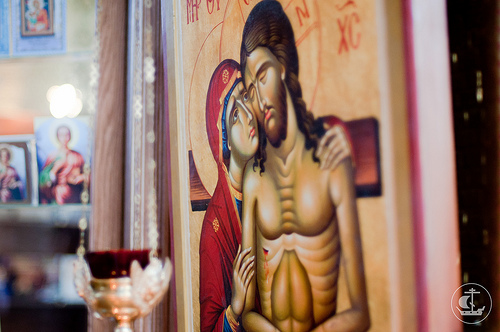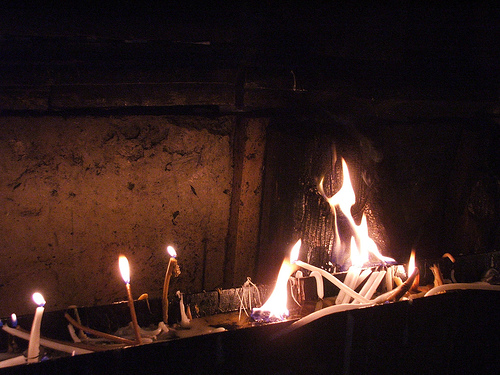
By spbda under a CC license on Flickr
Easter is the most important religious holiday in Greece. The Greek culture is rich in traditions and rituals followed during the Holy Week. This post is about the ritual of the Άγιο Φως (Holy Light or Holy Fire) which takes place on Saturday night before Easter Sunday.
This ritual, which is considered as a miracle by the Orthodox Christians, takes place in the Church of the Resurrection in Jerusalem (the Greek word for the city is Ιεροσόλυμα, in the plural) in the place where Christ was resurrected from the dead. The local authorities enter the tomb of Christ and make sure that there is no source of fire and they have the door sealed with wax. Afterwards, the Patriarch (Πατριάρχης) prays and a blue light comes off the tomb in an atmosphere of reverence. The light is given to the representatives of the other churches, Russians, Armenians and Copts for instance, and then to the pilgrims. The Patriarch is meticulously searched by the authorities in order to make sure that he doesn’t carry any source of fire.
The light arrives in Greece by a plane and is transported to the church “Metropolis of Athens” (Μητρόπολη Αθηνών) and to the Greek churches. At the service of Holy Saturday, it is given to the people. At midnight, the priest chants the Χριστός Ανέστη (Christ has risen) hymn and gives the light. Traditionally, the candles to carry the light are white but most people, especially children, carry decorated candles (λαμπάδες) which are given to them as Easter present by their godmothers. They say Χριστός Ανέστη and give each other the kiss of love (το φιλί της αγάπης). When they arrive home, they form a cross with the smoke of the fire at the transom of the door. The people who have a small altarpiece at home put the fire there and keep it lit until the following year.
It is obvious that for some people this is a miracle but for some others it is just fraud. In spite of what people believe, it is the most important ritual that takes place in Easter and has lasted for many centuries. Even people who are not religious go to church that day as all this is an old and cherished cultural and social event.
If you ever visit Greece on the Orthodox Easter, this ceremony is worth seeing, even though the churches are crowded, because it is part of the Greek culture.

By Nina A.J. under a CC license on Flickr






